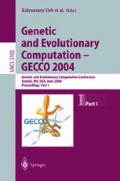Abstract
Particle Swarm Optimization is gaining momentum as a simple and effective optimization technique. We present a new approach to PSO that significantly reduces the number of iterations required to reach good solutions. In contrast with much recent research, the focus of this work is on fundamental particle motion, making use of the Kalman Filter to update particle positions. This enhances exploration without hurting the ability to converge rapidly to good solutions.
Access this chapter
Tax calculation will be finalised at checkout
Purchases are for personal use only
Preview
Unable to display preview. Download preview PDF.
References
Kennedy, J., Eberhart, R.C.: Particle swarm optimization. In: International Conference on Neural Networks, IV, Perth, Australia, pp. 1942–1948. IEEE Service Center, Piscataway
Kennedy, J., Eberhart, R.C.: A discrete binary version of the particle swarm algorithm. In: Proceedings of the World Multiconference on Systemics, Cybernetics, and Informatics, Piscataway, New Jersey, pp. 4104–4109 (1997)
Kennedy, J., Spears, W.: Matching algorithms to problems: An experimental test of the particle swarm and some genetic algorithms on the multimodal problem generator. In: Proceedings of the IEEE Congress on Evolutionary Computation (CEC 1998), Anchorage, Alaska (1998)
Riget, J., Vesterstroem, J.S.: A diversity-guided particle swarm optimizer - the ARPSO. Technical Report 2002-02, Department of Computer Science, University of Aarhus (2002)
Løvbjerg, M.: Improving particle swarm optimization by hybridization of stochastic search heuristics and self-organized criticality. Master’s thesis, Department of Computer Science, University of Aarhus (2002)
Richards, M., Ventura, D.: Dynamic sociometry in particle swarm optimization. In: International Conference on Computational Intelligence and Natural Computing (2003)
Vesterstroem, J.S., Riget, J., Krink, T.: Division of labor in particle swarm optimisation. In: Proceedings of the IEEE Congress on Evolutionary Computation (CEC 2002), Honolulu, Hawaii (2002)
Shi, Y., Eberhart, R.C.: Parameter selection in particle swarm optimization. In: Evolutionary Programming VII: Proceedings of the Seventh Annual Conference on Evolutionary Programming, New York, pp. 591–600 (1998)
Kennedy, J., Mendes, R.: Population structure and particle swarm performance. In: Proceedings of the Congress on Evolutionary Computation (CEC 2002), Honolulu, Hawaii (2002)
Kennedy, J., Mendes, R.: Neighborhood topologies in fully-informed and best-ofneighborhood particle swarms. In: Proceedings of the 2003 IEEE SMC Workshop on Soft Computing in Industrial Applications (SMCia 2003), Binghamton, New York, IEEE Computer Society, Los Alamitos (2003)
Kennedy, J.: Small worlds and mega-minds: Effects of neighborhood topology on particle swarm performance. In: Angeline, P.J., Michalewicz, Z., Schoenauer, M., Yao, X., Zalzala, Z. (eds.) Proceedings of the Congress of Evolutionary Computation, vol. 3, pp. 1931–1938. IEEE Press, Los Alamitos (1999)
Mendes, R., Kennedy, J., Neves, J.: Watch thy neighbor or how the swarm can learn from its environment. In: Proceedings of the IEEE Swarm Intelligence Symposium (SIS 2003), Indianapolis, Indiana, pp. 88–94 (2003)
Krink, T., Vestertroem, J.S., Riget, J.: Particle swarm optimisation with spatial particle extension. In: Proceedings of the IEEE Congress on Evolutionary Computation (CEC 2002), Honolulu, Hawaii (2002)
Angeline, P.J.: Using selection to improve particle swarm optimization. In: Proceedings of the IEEE Congress on Evolutionary Computation (CEC 1998), Anchorage, Alaska (1998)
Clerc, M., Kennedy, J.: The particle swarm: Explosion, stability, and convergence in a multidimensional complex space. IEEE Transactions on Evolutionary Computation 6, 58–73 (2002)
Kennedy, J.: Bare bones particle swarms. In: Proceedings of the IEEE Swarm Intelligence Symposium (SIS 2003), Indianapolis, Indiana, pp. 80–87 (2003)
Kalman, R.E.: A new approach to linear filtering and prediction problems. Transactions of the ASME–Journal of Basic Engineering 82, 35–45 (1960)
Russel, S., Norvig, P.: Artificial Intelligence: A Modern Approach, 2nd edn. Prentice Hall, Englewood Cliffs (2003)
Author information
Authors and Affiliations
Editor information
Editors and Affiliations
Rights and permissions
Copyright information
© 2004 Springer-Verlag Berlin Heidelberg
About this paper
Cite this paper
Monson, C.K., Seppi, K.D. (2004). The Kalman Swarm. In: Deb, K. (eds) Genetic and Evolutionary Computation – GECCO 2004. GECCO 2004. Lecture Notes in Computer Science, vol 3102. Springer, Berlin, Heidelberg. https://doi.org/10.1007/978-3-540-24854-5_13
Download citation
DOI: https://doi.org/10.1007/978-3-540-24854-5_13
Publisher Name: Springer, Berlin, Heidelberg
Print ISBN: 978-3-540-22344-3
Online ISBN: 978-3-540-24854-5
eBook Packages: Springer Book Archive

